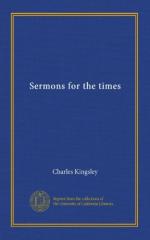First, these heathens had a dim remembrance that man was made in the likeness of God, and lived by Faith in God, and therefore that men’s names were to express that, as indeed many of their old names do. But, alas! the likeness of God in fallen man is like a tree without roots, or rather a tree without soil to grow in. God’s likeness in man can only flourish as long as he is joined to Christ, the perfect likeness of God, the true life and the true light of men, the foundation which is already laid, and the soil in which man was meant to grow and flourish for ever, and as long as he is fed by the Spirit of God, the Lord and Giver of Life, who proceeds—never forget that, or you will lose the understanding both of who God is and what man is—proceeds not only from God the Father, but also from God the Son, the Lord Jesus Christ. And therefore, in the heathen, God’s likeness withered and decayed, as a tree withers and decays when torn up from the soil. And first, they began to call themselves after the names of false gods, which they had invented out of their own carnal fancies. Then they called themselves after the names of their dumb animal’s. So, Pharaoh means, ‘The Sun-God’; the Ammonites mean, ‘The people who worshipped the ram as a god’; Potiphar means, ‘A fat bull,’ which the Egyptians used to worship; and I could tell you of hundreds of heathen names more, like these, which are ridiculous enough to make one smile, if we did not keep in mind what tokens they are of sin and ignorance, and the likeness not of God, but of the beasts which perish.
Then comes another set of names, showing a lower fall still, when heathens have quite forgotten that man was originally made in God’s likeness, and are not only content to live after the likeness of the beasts which perish, but pride themselves on being like beasts, and therefore name their children after dumb animals,—the girls after the gentler and fairer animals, and the boys after ravenous and cruel beasts of prey. That has been the custom among many heathen nations; perhaps among almost all of them, at some time or other. It is the custom now among the Red Indians in North America, where you will find one man in a tribe called ‘The Bull,’ another ’The Panther,’ and another ‘The Serpent,’ and so on; showing that they would like to be, if they could, as strong as the bull, as cruel as the panther, as venomous as the serpent. What wonder that those Red Indians, who have so put on the likeness of the beasts, are now dying off the face of the earth like the beasts whom they admire and imitate?
And this was the way with our own heathen forefathers before the blessed Gospel was preached to them. It is frightful, in reading old histories, to find how many Englishmen, our own forefathers, were named after fierce wild beasts, and tried, alas! to be like their names—children of wrath, whose feet were swift to shed blood, under whose lips was the poison of adders, and destruction and bloodshed following




